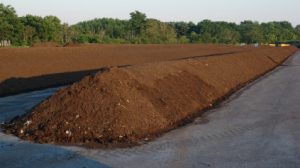Vision
Legislation
Resources
Membership
Contact
Composted Organics
 Composting is the best possible use of recycled green materials and wood waste resulting in healthy soils for a healthy environment. Composting is a simpler, more desirable practice than more resource intensive alternatives like anaerobic digestion, co-mingling with biosolids or other technologies, because composting is the acceleration of an already occurring natural process – requiring fewer steps, less energy, less water, capital investment and other inputs.
It takes approximately 3,000 years for nature to produce six inches of topsoil. Every 28 years, one inch of topsoil is lost as a result of current farming practices. Organic biointensive farming can produce six inches of topsoil in as little as 50 years—60 times faster than the rate in nature (2). California’s organic recycling and composting companies convert wood waste and green materials into compost and mulch every 45 – 60 days.
Organic matter and soil life make up just a small part of the soil volume, but are the glue that holds healthy soil together. Decomposing plant materials (like compost) support a great variety of beneficial organisms ranging from microscopic bacteria to earthworms. One teaspoon of compost-rich organic soil hosts 600 million to 1 billion helpful bacteria from 15,000 species. One teaspoon of chemically treated soil can host as few as 100 bacteria (3).
Composting is the best possible use of recycled green materials and wood waste resulting in healthy soils for a healthy environment. Composting is a simpler, more desirable practice than more resource intensive alternatives like anaerobic digestion, co-mingling with biosolids or other technologies, because composting is the acceleration of an already occurring natural process – requiring fewer steps, less energy, less water, capital investment and other inputs.
It takes approximately 3,000 years for nature to produce six inches of topsoil. Every 28 years, one inch of topsoil is lost as a result of current farming practices. Organic biointensive farming can produce six inches of topsoil in as little as 50 years—60 times faster than the rate in nature (2). California’s organic recycling and composting companies convert wood waste and green materials into compost and mulch every 45 – 60 days.
Organic matter and soil life make up just a small part of the soil volume, but are the glue that holds healthy soil together. Decomposing plant materials (like compost) support a great variety of beneficial organisms ranging from microscopic bacteria to earthworms. One teaspoon of compost-rich organic soil hosts 600 million to 1 billion helpful bacteria from 15,000 species. One teaspoon of chemically treated soil can host as few as 100 bacteria (3).
2 Maine Organic Farmer & Gardener, 1999, in “Our food, our future,” by Donella H. Meadows, in Organic Gardening, September/October 2000.
3 Elaine R. Ingham, soil scientist, Oregon State University, “Our food, our future,” by Donella H. Meadows, in Organic Gardening, September/October 2000.
Privacy | Contact
Copyright 2020, California Compost Coalition. All Rights Reserved.
Designed and developed with open source software on solar powered servers by Mobius Intelligent Systems, LLC.
